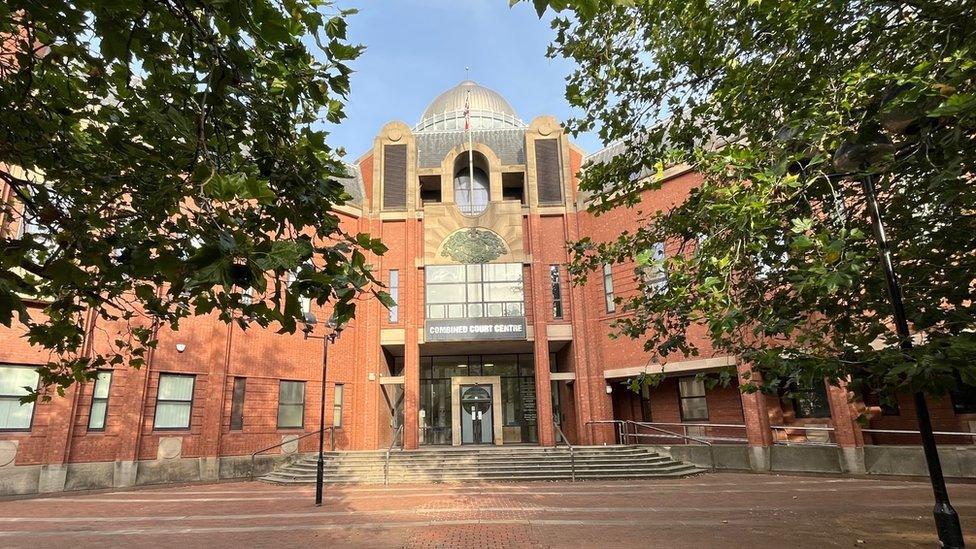'Aquaplaning' driver could not avoid Bridlington fatal crash - expert
- Published

Driver Laila Barnard-Wigley is on trial at Hull Crown Court
A woman accused of causing two people's deaths by dangerous driving could not have avoided a crash because her car had aquaplaned, a court has heard.
The car driven by Laila Barnard-Wigley, 25, veered and crashed head-on into another vehicle, killing driver and passenger, Hull Crown Court was told.
Prosecutors had claimed she was in a hurry to get to a beauty salon on 7 May 2021, the Hull Daily Mail reported, external.
An expert told the court the crash was "consistent" with aquaplaning.
Peter Davey, a collision reconstruction specialist, said footage from an HGV at the time of the crash showed there was "a film of water on the road surface" left by rain earlier in the day.
Giving evidence as an independent witness, he said: "For me, very, very obvious, very, very quickly, was that this was most consistent with an aquaplaning event.
"There was no other explanation to why the car would have acted in the way it acted without it having aquaplaned."
Mr Davey, a former road traffic policing officer, said it "wouldn't have been a case of lack of attention".
"This was a relatively violent and quick traverse across the carriageway into the path of the oncoming car," he added.
'Rudderless boat'
Hull Crown Court had heard that the crash happened on the afternoon of 7 May 2021 as Miss Barnard-Wigley was driving on the A165 at Scarborough Road, Bridlington, near the junction of Grindale Road crossroads.
The Mercedes Benz she was driving was involved in a collision with a red Peugeot 208 car being driven by Dean Yarrow, 33, with his girlfriend, Faye Wardle, 32, as the front seat passenger.
They both died at the scene, while a young boy who was in the rear of the car suffered serious injuries.
According to the Hull Daily Mail, Michael Greenhalgh, prosecuting, had earlier told the court that Miss Barnard-Wigley was said to have been "in a hurry" to get to a Bridlington beauty salon, where she had arranged to sell some beauty products to the owner.
He said she had made five or six attempts to overtake another car a few minutes earlier because she was running late.
Asked by defence barrister Richard Dawson on Friday whether Miss Barnard-Wigley would have been able to do anything to stop her car aquaplaning, Mr Davey replied: "Absolutely nothing at all."
"Once you aquaplane, the four wheels come off the road surface and the car becomes a rudderless boat," he explained.
"As a driver, there is nothing you can do to change the direction or speed of that car until the wheels settle back down on the road surface."
Miss Barnard-Wigley, of Thoresby Avenue, Bridlington, has denied causing the deaths by dangerous driving of Mr Yarrow and Miss Wardle, and alternative charges of causing their deaths by careless or inconsiderate driving.
She has also denied causing serious injury to a young boy by dangerous driving.
The trial continues.

Follow BBC East Yorkshire and Lincolnshire on Facebook, external, X (formerly Twitter), external, and Instagram, external. Send your story ideas to yorkslincs.news@bbc.co.uk, external